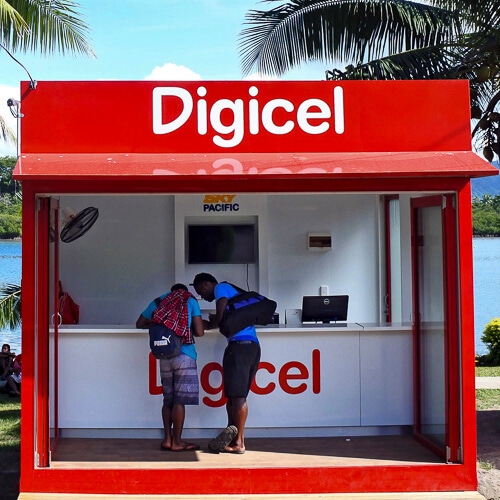Australia close to acquiring Digicel Pacific – report
Australian government and Telstra reportedly on brink of deal with debt-laden Digicel Group; widely seen as political manoeuvre to stymie China's influence in the region.

The Pacific assets of Jamaican-headquartered Digicel Group, founded by Irish billionaire businessman Denis O'Brien, have been on the market since late last year. And according to sources cited by Reuters, debt-laden Digicel is now oh-so close to accepting overtures from the Australian government and Telstra.
"It is fairly imminent," said someone who apparently has an ear on the ground in government circles. "I can't put a timetable on it, but the deal is almost done."
Figure 1:  A spot of shopping: Digicel may be close to being bought by Telstra and the Australian government, according to Reuters.
A spot of shopping: Digicel may be close to being bought by Telstra and the Australian government, according to Reuters.
(Source: Rafael Ben-Ari / Alamy Stock Photo)
The Australian duo has been in the frame to acquire Digicel's businesses in the Pacific, which span from Papua New Guinea to Fiji, Samoa, Vanuatu and Tahiti, since at least July.
Local media outlets at the time said the Australian government was willing to stump up AUD 1.5 billion ($1.1 billion) of taxpayers' money for its foray into the Pacific, while Telstra was apparently committed to somewhere between AUD 200 million ($148 million) and AUD 300 million ($223 million).
Under the terms of the bid, as reported by the Sydney Morning Herald, Telstra had asked O'Brien to remain on the board of Digicel Pacific and to underwrite revenue forecasts for three years. Moreover, Telstra described Digicel Pacific as "a commercially attractive asset.”
O'Brien, at least initially, reportedly put a $2 billion price tag on Digicel's operations in the Pacific.
Heading China off at the Pacific pass
When reports of talks first surfaced between Digicel and Australia in July, blocking China was widely seen – despite the apparent assessment of the Pacific assets as being "commercially attractive" – as the real motive for any transaction. Rumors of a previous bid by state-owned China Mobile appeared to focus Antipodean minds.
"The Australian government is trying to achieve a few things at once," said Jonathan Pryke, director of the Pacific Islands Program at the Lowy Institute, a Sydney-based think tank, cited by Reuters.
"Digicel is the primary player in the Pacific and Australia sees it as a strategic asset that they can't allow to fall into the hands of China. They are keen to get Australian business back into the Pacific and they've come to the realisation that they are going to have to underwrite."
Want to know more about 5G? Check out our dedicated 5G content channel here on
Light Reading.
In tandem with the US, Australia has made a series of moves in recent years to exclude China interests from Pacific cable infrastructure.
Washington has refused to license multiple trans-Pacific cables scheduled to land in Hong Kong. Recently it has joined with Australia, the US and Japan in financing a 2,000km cable linking Micronesia, Kiribati and Nauru.
Three years ago, Australia stepped in to fund the 4,000km Coral Sea cable in order to sideline Huawei.
Related posts:
— Ken Wieland, contributing editor, special to Light Reading
Read more about:
AsiaAbout the Author(s)
You May Also Like












